Disability Justice is Focus of August Be A Voice Advocacy Toolkit
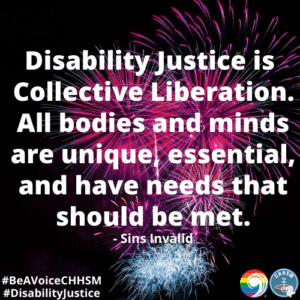
One historic outreach within the UCC’s Council for Health and Human Service Ministries is providing services to and advocating with and for persons with disabilities. And, as the August installment of the Be A Voice Health and Human Services Advocacy Toolkit — produced by CHHSM and the UCC’s Justice and Witness Ministries office in Washington, D.C. — relates, disability justice has come a long way since early efforts at recognizing the value and God-given gifts of persons with disabilities.
“CHHSM has been involved in direct services, housing, and health care to persons with disabilities since the late 19th century,” says the Rev. Elyse Berry, D.Min., associate for advocacy and leadership development. “Today, disability justice advocacy requires understanding the broad range of issues involved — such as access to public education and housing, food insecurity, systemic racism, police brutality, health inequities, and more — in order to secure justice for persons with disabilities.”
“Disability justice,” a term coined in 2005 by three queer women of color — Patty Berne, Mia Mingus, and Stacey Milbern — addresses how disability and ableism intersect with other forms of oppression and identities, among them persons of color, LGBTQ+ persons, immigrants, people who are homeless or economically disadvantaged, and persons who are incarcerated. It recognizes how intersecting oppressive systems of white supremacy, colonial capitalism, homophobia, sexism, ableism, and more have influenced how persons’ bodies and minds are valued and/or labeled as deviant, disposable, or unproductive.
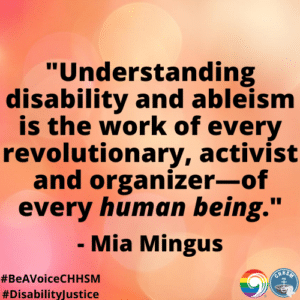
As co-founder Mingus says, disability justice moves “away from a rights-based equality model and beyond just access to a framework that centers on justice and wholeness for all disabled people and communities.”
Part of that justice ministry lies with the amazing direct support professionals (DSPs) employed by CHHSM members. At Emmaus Homes in St. Louis, for example, DSPs work closely helping residents achieve goals they themselves set. For example, Katrina — who moved to Emmaus in 2016 — has a series of goals intended to help her become more independent. With the help of her DSP, Tracy, Katrina is in training for her current goal — getting a job — by volunteering at the local Goodwill two days a week.
Not only does Emmaus — and other CHHSM members like Peppermint Ridge in Corona, Calif. — have the dual challenge of helping residents strive for individual goals while working for justice and equal treatment; they also struggle to engage and keep good staff members. The reason? Government reimbursement — a major income source — is too low to attract and keep staff. The situation is both dire and important, so much so that Emmaus’ Board of Directors currently is investing $10 million over three years to help retain their high quality staff members: people like Tracy, whose impact on Katrina’s life is incalculable.
UCC Involvement Key in Justice for Persons with Disabilities
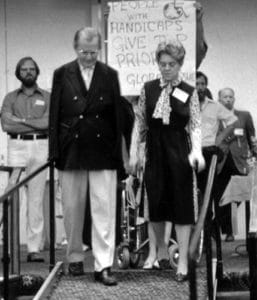
The United Church of Christ work in disability justice continues thanks to the tireless efforts of UCC members, clergy and organizations. Such groups as the UCC’s Disabilities Ministries and the UCC’s Mental Health Network, among others, continue to lead this important advocacy ministry.
Among the early advocates were the Rev. Virginia Kreyer and the Rev. Harold Wilke. Kreyer, born with cerebral palsy, brought a resolution to the UCC’s biennial General Synod in 1977 that led to the creation of the Advisory Committee on the Church and the Handicap (later renamed the UCC National Committee on Persons with Handicaps).
Wilke, who was born without arms and hands, was key to early legislation on Capitol Hill that paved the way for the later Americans with Disabilities Act.
As Hugh Gallagher, a Capitol Hill staff member in the 1960s who drafted the first legislation on architectural access for the handicapped, told the Los Angeles Times in 2003, “We’d all been disabled for years, but in a medical context: We were sick people who never got well. The disability rights model is that we are oppressed people who were denied our civil rights. Harold was instrumental in developing this concept, which is the key to the whole disability rights movement.”
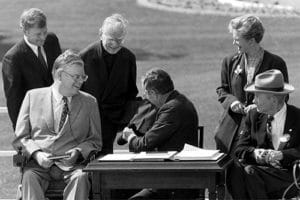
Wilke learned to write and do other activities normally reserved for hands and arms with his feet, including writing. He was present at the signing of the Americans with Disabilities Act of 1990. Then-President George H.W. Bush presented Wilke with one of the signing pens, which Wilke accepted with his left foot.
During the ceremony, Wilke was invited to offer a prayer. “‘Let my people go,’ you did decree, O God, demanding that all your children be freed from the bonds of slavery. Today, we celebrate the breaking of the chains which have held back millions of Americans with disabilities,” Wilke prayed. “Today, we celebrate the granting to them of full citizenship and access to the promised land of work, service, and community. Bless this gathering, this joyous celebration. Bless our president as he signs the Americans with Disabilities Act, and strengthen our resolve as we take up the task, knowing that our work has just begun. Bless the American people and move them to discard those old beliefs and attitudes that limit and diminish those among us with disabilities.”
The Work has Just Begun
This past July, the ADA celebrated its 30th anniversary. But there is still much to do. In addition to continuing the work to make every place accessible to all, new advocacy efforts focus on the intersections of racism, sexism, and negative assumptions about persons with disabilities.
According to the toolkit, persons of color make up the majority of people with disabilities, although white people are most often represented in the media. Additionally, people who are poor and have fewer opportunities for education have disabilities at disproportionate rates, as do people who are incarcerated. One of the highest incidences of disability is chronic pain, which disproportionately affects women — who are less likely to receive pain medication than men.
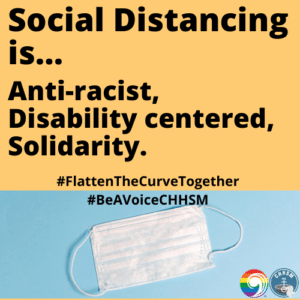
The COVID-19 pandemic has heightened awareness of these inequities. “Someone with a disability is twice as likely to live in poverty and be unemployed. Those rates are even higher for people living with a disability who are Black or Native,” says Katie Adams, UCC policy advocate for domestic issues. “We need to establish more inclusive economic protections and rules that make sure that people can get jobs, get paid a fair wage and receive inclusive job training and education. This lack of ability to build economic security means that people face a much higher rate of poverty and homelessness.”
Protections for persons with disabilities also need to be included in any COVID-19 relief acts, Adams adds, as we determine how to navigate both the public health crisis and the resultant economic crisis. Legislation should include “investments in home and community-based services for those with disabilities and increased funding for Medicaid and continuation of the coverage of the state-share for Medicaid,” she says. “The essential health care and supports for people with disabilities should be recognized as such, by classifying those who provide direct support as essential workers.”
In addition to information and background, the toolkit provides questions to ask candidates running for political office; social media graphics; and links to a variety of UCC-related groups and resources on such topics as disability justice, the Americans with Disabilities Act, and the current DSP shortage.
The disability justice section of the toolkit will be released this week.
Join Our Mailing LIst
"*" indicates required fields
Follow on Facebook
New Resident Finds Belonging at Emmaus Homes - CHHSM
www.chhsm.org
Heather’s journey toward independence has been nothing short of inspiring. Since moving into her new home last year, Heather’s world has expanded in ways she never imagined. Leaving the familiarit...